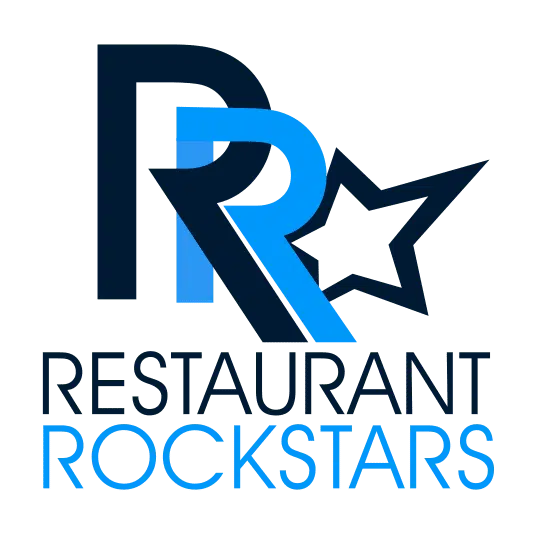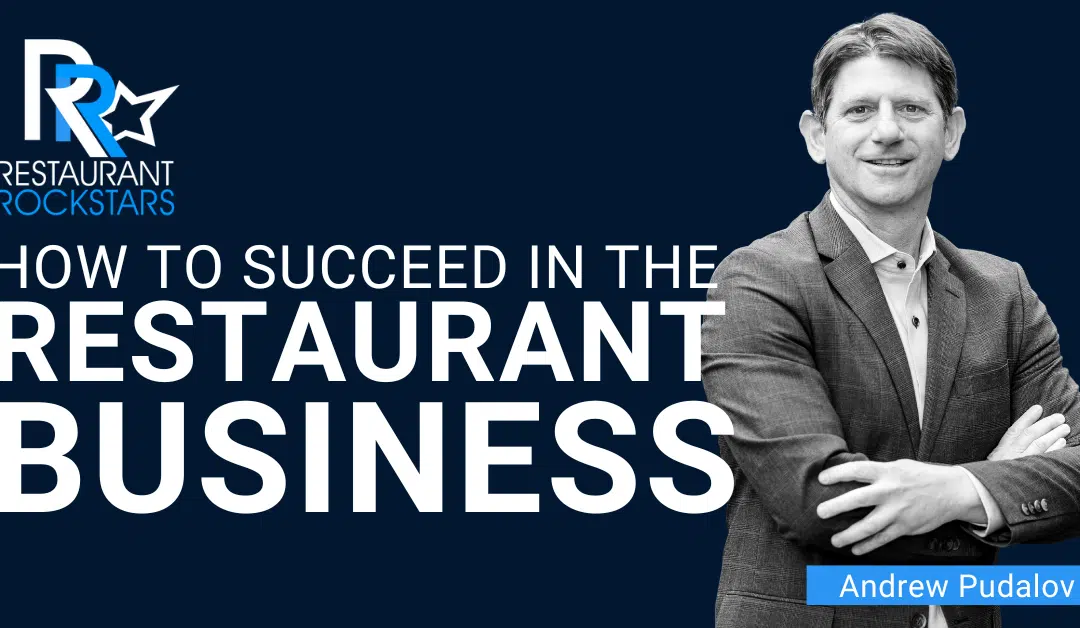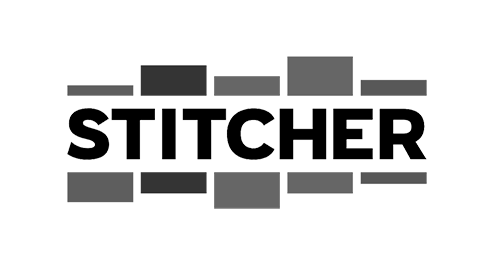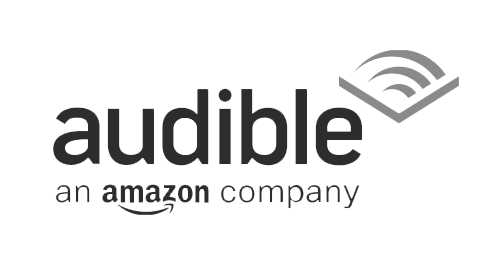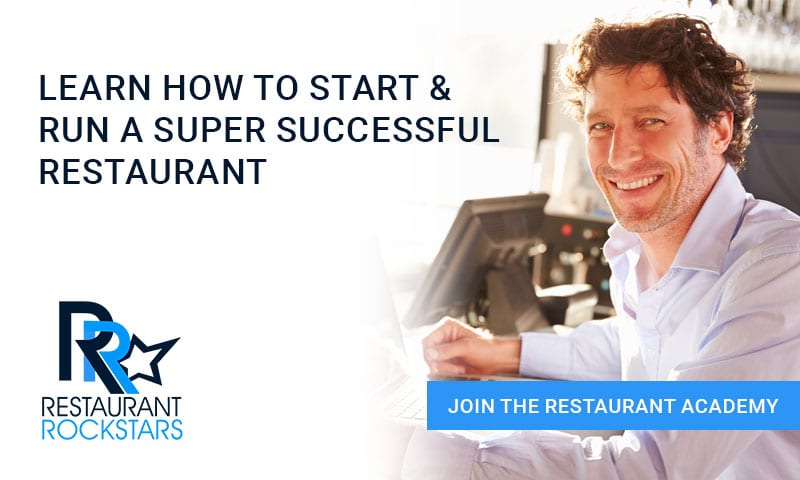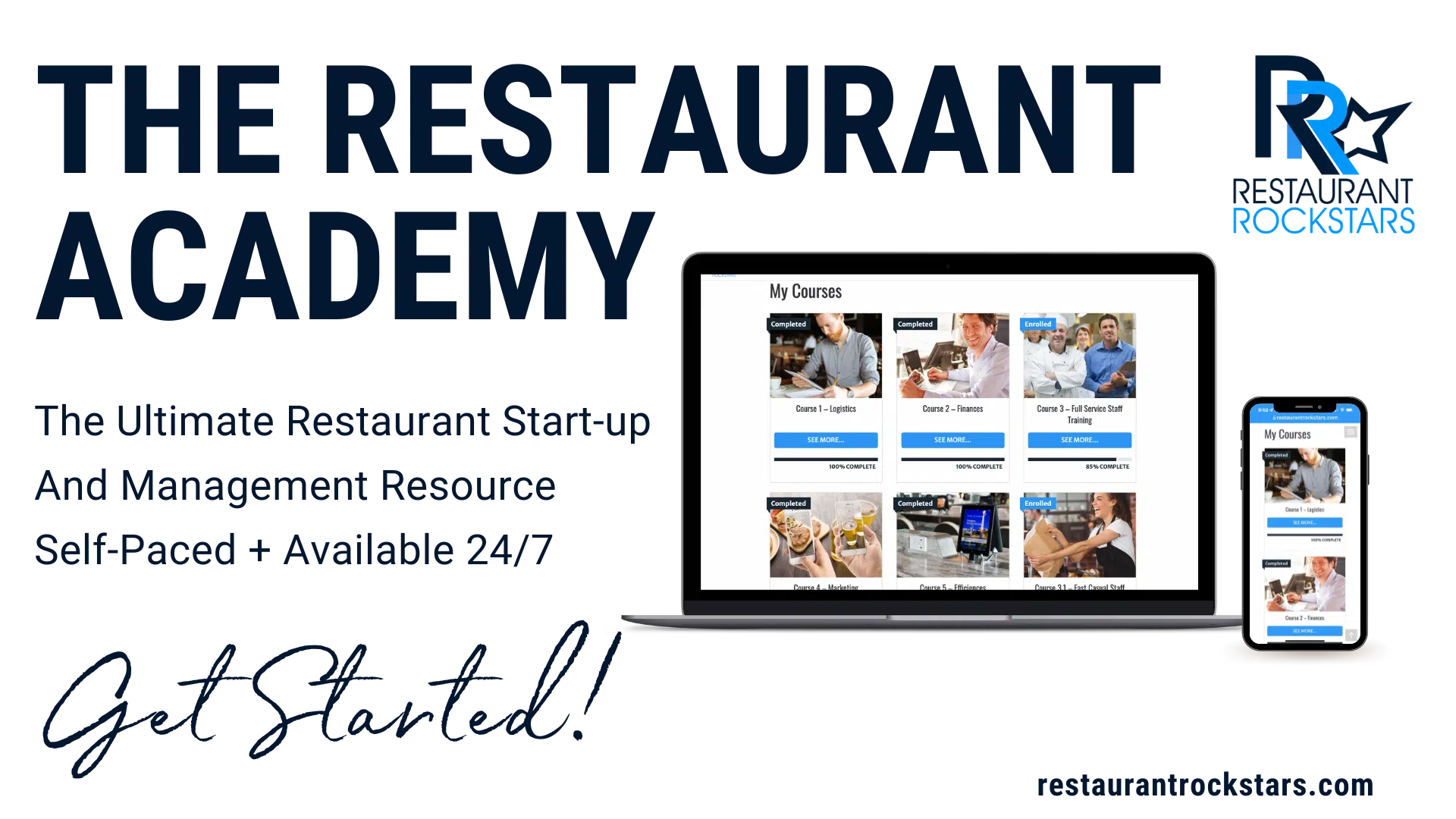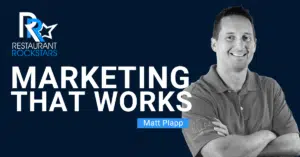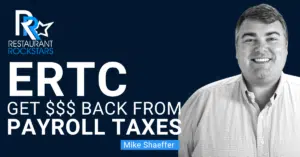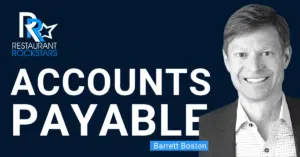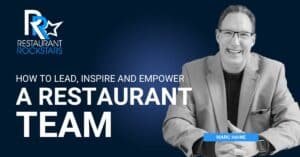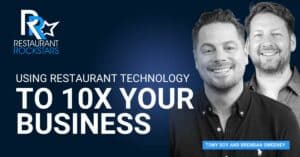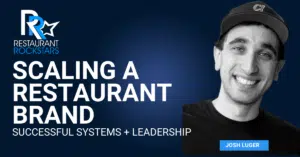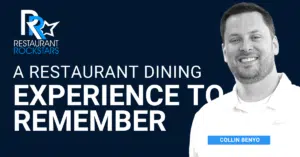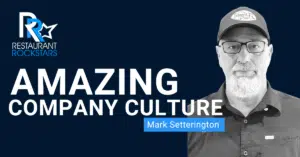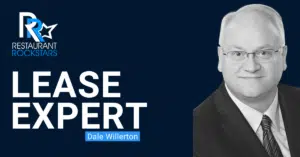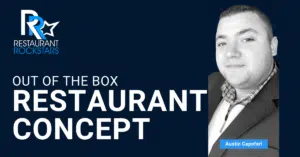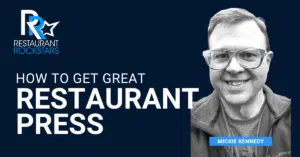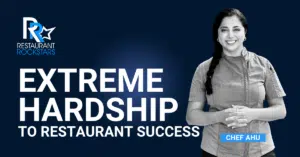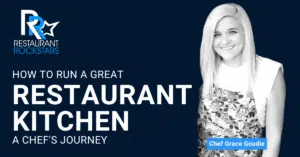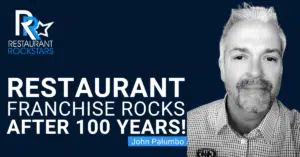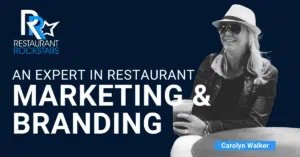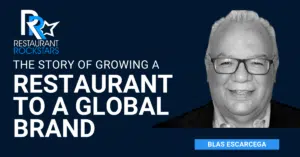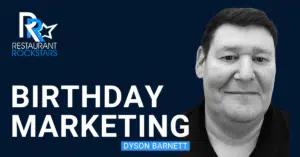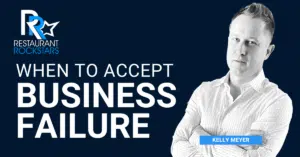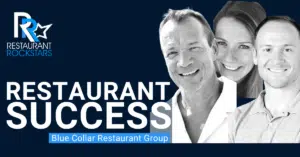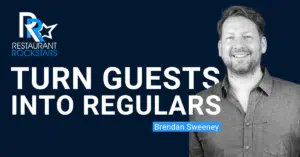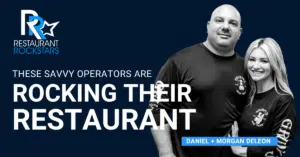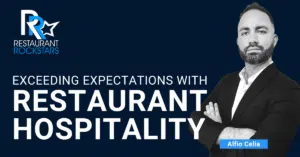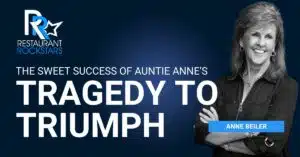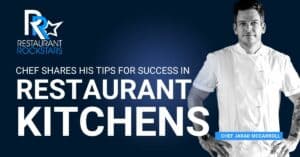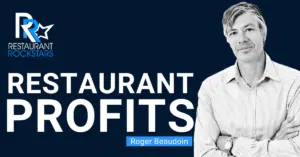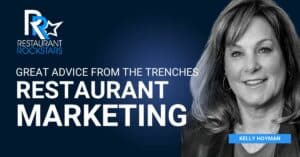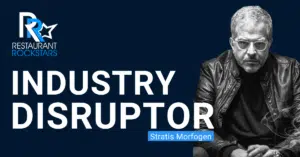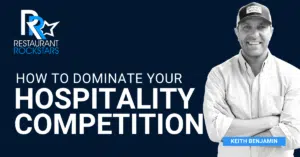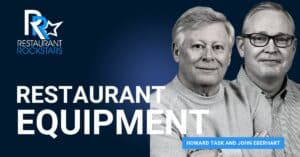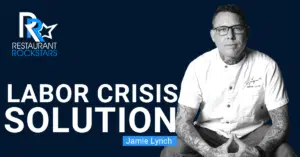Restaurant Rockstars Episode 330
How to Succeed in the Restaurant Business
LISTEN HERE OR ON YOUR FAVORITE PODCAST PLAYER
Prefer to watch the interview?
Click the video below.
What’s the magic formula to succeeding in the restaurant business? It’s Food, Service, Ambiance and Brand Building!
You’ll find it all if you tune-in.
In this episode of the Restaurant Rockstars Podcast, I speak with Andrew Pudalov, the CEO of Rush Bowls. Following 9/11, Andrew successfully pivoted from a high-flying finance career to the restaurant business.
He’s going to tell us:
- The brainchild for his fast, delicious and nutritious concept
- All about the entrepreneurial process and timeline to launch and build this brand
- His biggest mistakes, challenges, successes and experiments
- How mentoring business and financial skills to young employees is paying off
- Leadership style and sharing the passion for hospitality
- The necessary systems to grow to multiples stores and franchise
- How to over-deliver on the “guest experience”
And of course, overcoming today’s pain points and strategy moving forward.
Watch or listen to this episode then go out and ROCK your Restaurant!
Roger
Connect with our guest:
Instagram: @RushBowls
Facebook: @RushBowls
Twitter: @RushBowls
You know, for us training is key, right? This product, you know, it’s customer service. It’s understand, you know, like you said the operations being consistent and store design look and feel and making sure that people are going to operate a business as you would, which is probably one of the hardest, right? Even if they interview well, are they going to operate the business and care about their own business as much as you cared about yours? Are they the right partners?
Welcome back to the podcast. Thanks again for joining me. This episode is near and dear to my heart for many reasons. It’s about mentoring, and getting the most out of your team because service is probably the most important thing you can deliver as a competitive advantage. This episode is also about a fast growing concept that has food service and ambiance. You’re not gonna want to miss this episode, it talks about pivots, it talks about the current pain points and challenges in this business that we’ve all dealt with, and a fresh approach to growing a business. Stay tuned. Thanks also to the sponsors of this week’s episode: Whirks, The Birthday Club and the Restaurant Rockstars Academy. Now on with the episode,
You’re tuned in to the restaurant rockstars podcast powerful ideas to rock your restaurant, here’s your host, Roger Beaudoin.
Hey rockstars, let’s talk Restaurant Marketing. I started and ran five restaurants and I was obsessed with marketing, not the traditional kind, we should try this and you try that and you hope for the best. That’s like dumping $100 bills out the window, but nobody’s coming in the door. I’m talking about marketing that’s trackable where you know exactly where the business is coming from, and most important that it delivers far more than every penny you spend. So here’s where my friend Dyson comes in. He’s a restaurant person just like you owned his own concepts. Now he runs fanConnect. He’s got something called the Birthday Club that’s proven to drive new and repeat business in your door because everybody has a birthday. He does it all for you to all the heavy lifting. All you have to do is focus on your guests and delivering true hospitality. Why not speak with Dyson yourself. He loves talking shop with operators and there’s no obligation, but I’m pretty sure he can boost your business and put more butts in your seats. If I still own restaurants. It’s exactly what I do. Check it out at fanconnect.com/birthdayrockstar
Restaurant owners and managers Listen, it’s not too late to claim your employer retention credit. But you have to act soon. If you haven’t heard of this, your business can receive money back from the IRS money have already paid in payroll taxes. Nothing you do today is more important. Now this is free and clear cash that your business is owed by the government, the ERC program is available if your operation had 500 employees or less, you had to shut down or partially suspend your business, or you had at least a 20% decrease in business due to COVID 19. During any quarter of 2020. And the first three quarters of 2021. Know your business can get up to $7,000 per employee per quarter for 21 and up to $5,000 per employee in 2020. Now if you have just 10 employees today and meet the requirements, you can receive up to $260,000 back in a refundable tax credit that you don’t have to pay back. Now the faster you apply, the quicker you get the money but you must do it soon. You can use the money for any purpose payroll cost of goods, business improvement or other expenses. Again, you don’t have to pay this money back now works is a company that will do everything for you to get the money that you’re owed. Now I’m speaking from experience with works. My restaurant received big checks in all available quarters and Whirks people and process made it easy. For a no obligation consultation, click the link in the show notes to this episode and speak to them with no obligation. You pay nothing until they get you the cash app now.
Welcome back. This is the restaurant rockstars podcast with me today Mr. Andrew Pudalov and he is the founder and CEO of a really interesting concept called Rush Bowls. And it’s a franchise and we’re going to cover a lot of ground talking about the brainchild for this and where it all began. So welcome to the show. Andrew, really glad to have you here.
Well, thank you so much for having me. I’m excited to get going. Well, you know, restaurants start in a variety of ways. And you have a particularly interesting story. Why don’t we talk about New York City and finance and 911 You know, such a tragedy that happened such a life altering moment for so many Americans. And you know, just the whole country was shaking, the whole world was shaken by this tragic event. And you were right in the thick of New York City finance. So tell us about your time in New York before 911? What happened in your experiences with 911? And then what forced you to move out in New York City and it literally shaped your life and what you’re doing now? Sure.
So, you know, certainly my career in finance really started early on, I was always I started at Bear Stearns, then grew to Morgan Stanley Credit Lyonnais, and then National Australia Bank, all really foremost, for most of the large portion, all fixed income derivative trading. So just to most people don’t know what that is. But that’s I was a gambler for the bank, right? So I would take funds and make calculated mathematical bets on certain items that would sit on the books for a long time, very mathematically oriented, I was a professional gambler, no different in many ways, and going to Vegas and having someone really make strategic bets. Except, you know, it’s a little different. There’s no real house here. You know, there’s the houses, I’m making calculated decisions on behalf of the bank, and I’m taking those positions on behalf of the bank. So it’s not a broker. I did for a long time. It’s a very, very highly stressful job. Most people are not in it for a long, long time. It’s very rewarding, obviously, in many ways, but it’s also incredibly stressful. And, you know, I lived in Manhattan for 15 years. And then, really, I was working in Midtown, my wife was on maternity leave, she was in and most people don’t even realize this in 93. There was a bombing on the World Trade Center prior. And she was in a tower really high up, I think, 80s or 90s. In that first bombing, I remember that. That event of for sure. So this is interesting that your wife was literally working in the towers, and they say that everything shook no matter what level you were on, like the the magnitude of that explosion did not cripple the towers. But it certainly made everyone just take notice and say what was that. And it was the first indicator that we were vulnerable in some ways on our shores. So keep going. This is fascinating stuff. And what was crazy about that is they they basically placed there was no communication in the building, also at the time of 93. And we didn’t, we were friendly, but we didn’t really know each other other than she lived in a big building similar to me at the time, but it was pretty traumatic on a lot of levels then, and then going forward. It’s her first day back from maternity, we’re living in Manhattan, I have a child, two children now, and one is literally an infant, infant and others, you know, a year old, basically are unhelpful. She’s in the 20s. And when I say 20s 20, around 20 Street in Manhattan, I’m in Midtown. And for people who are not aware of New York City, you know, downtown, it’s just like it sounds it’s lower downtown. So you can visual, it’s the clearest, beautiful day, and a plane crashes. And she literally is talking to her boss. And she sees the plane crash and she’s pretty high up. And I’m in a town. And it is havoc, and it’s almost incomprehensible to understand. For me personally, the devastation of that day. I a lot of the conversations I had with people worked in that building. A good friend of mine actually got up to the top, which the experience from the 93 bombing is they locked the roof so you couldn’t even get to the top. And he ended up jumping along with a lot of other people in finance, especially cancer was hard hit. Right? And it was traumatic for me, I will tell you lots of levels because not even there after, in one of the buildings, we would have to evacuate all the time thereafter. When you’re in trading, you generally don’t evacuate or you’ll sit as long as possible. And you didn’t really know what was going on. So it wasn’t even just the tragedy. It was the aftermath of that tragedy. Also that was very impactful from if you were living in New York City. I don’t know if people remember but they were saying like, taped down your windows. So you have anthrax, you had anthrax on the subway and just a lot of these horrible, horrible catastrophic things and follow along. I was always kind of contemplating what I would do next, I was good at what I did. And it afforded me a quite a nice lifestyle in many ways, but it wasn’t satisfying. And what I personally missed in doing this job was that I had no interaction with really a lot of I had my friends, but customers and I, there’s no interaction, I would mine yours very, you know, to the point, there were a lot of not a lot of dilly dallying, and we had a, you know, a sales group. And they would take care of the sales to other institutions to wasn’t to people as institution institution. But there’s no outlet on a social aspect of things in that realm. And I missed it. And then, I always contemplated and observed in New York City, because I had little kids like, what are they going to eat? And at the time, and this is going back, unfortunately, a little bit by about 20 years. And so the choices for food for little kids were, you know, a hot dog grilled cheese pizza, there is no real thought of health food in this arena, especially that they would enjoy eating, it was also good for them. Exactly. Yeah, they kind of kids were an afterthought. And that really afforded me like maybe there’s something here. So after long discussions, and always wanting to live out west, I picked Boulder as a community that I felt, had a university there had easy access to a lot of travel. And something I can, you know, it has a great reputation to for people indoor, outdoor, especially outdoor activities, and with a focus on health and wellness. And now it’s important or important to me.
So I’m hearing that this sort of idea was in your head before 911 happened, like you were thinking about checking out just because Okay, the money was great. It wasn’t so gratifying. In many ways you were thinking of a lifestyle change. You’re probably talking this over with your wife and thinking, Okay, what’s our next move? Was this before you actually thought about starting rush poles, or you were thinking about just getting out of the city and just changing your life, 360 degrees doing something else, but you hadn’t quite come up with what you were going to do next? You were just starting to say, Hey, I think it’s time we move out and do something. Tell us about that.
Yeah, and I think certainly, before I even got married, I said, Hey, I’m going to move to Boulder someday, I wanted to do this, I kind of always wanted to live there, even as a little kid. And I can’t even tell you why I traveled out west, I was in Boulder maybe once in my life. So prior in the environment that I was in, in January, and when you’re taking large positions on behalf of the bank, banks, your longevity and the stress level, people are not doing it into their 40s, early, even into their 30s, if you can make it that long. You’re so I always had that this was not fulfilling for me long term. But I also knew you’re not going to most people are not going to do it long time. They’re either going to die of a heart attack, get into the horrible stuff, or you know, just quit. At some point. We generally say that.
Interestingly, you build a track record, you build a reputation in your business people know who you are and what you’re capable of and what your achievements have been in the past. But would you say that it gets to a point where you’re only as good as the last great decision you’ve made, then all of a sudden, something goes sideways. And now no one can see around corners, even though some people are very good at it. You know what I mean?
Yeah, I think in what I was doing, that was always the case, right? From day one, you’re always as good as your last because hey, your revenue generator, if you’re not generating revenue, and you know how to fire a lot of people that were good people, right? They weren’t generator. I mean, I wasn’t as worried about that. It might last year actually was probably my most successful year, there’s a lot going on financially that I was able to take advantage of in behalf of the bank, for me, personally was not that sets. And, you know, the higher highs were lower. Like, I don’t know the best way to explain it and listen, at the time you’re treated like a rock star, like any restaurant you want to go to any event you want to go to. And it’s a broker that’s happy to take you anywhere you want. Because they get commission on this stuff and it’s all disposable, you know, this course. So I wasn’t even into that. I didn’t go out as much you know, after a while. You know, you have to be sharp to you, you know, you, you got to be mathematically Yeah, very, very with it. So I wanted and I’m a, I’m a good builder, I like building things in terms of businesses, and I wanted to be challenged in a different way and, and come at it from a different perspective, and somewhat ignorant to the business itself, but come of it from probably a more financially based perspective.
So you’re very strong analytically. And what you’ve done has certainly helped you with what you’re doing now. But did you go to business school? Or did you just, you know, get into the finance world without actually having an MBA or something of that nature?
No, I, I have always been pretty analytical and my undergraduate business school and a graduate business school. So you know, I’ve been business focused, pretty strongly, I would say, you know, and then that’s, you know, that teachers is theory, and then there’s reality to which right the life the life lesson.
Yeah, yeah, we have a similar background, I didn’t really know much about the restaurant business when I started. But I had an MBA and I sort of Applied Business skills to running a business not running or opening a restaurant. And, you know, I point that out quite a bit. When I either consult, or I speak for the industry, you know, around the country, it’s like, don’t run a restaurant, run a business. Those are two separate things. You know, your products aren’t food and drink. It’s really about delivering experiences. And, you know, that’s lost on some people, but it opens their eyes when it’s a paradigm shift. So I totally see where you’re coming from this. Let’s talk about when that concept, we sort of touched on the fact that, you know, you had a young family, a growing family, you we talked about boulder being a place that you wanted to relocate in, and then all of a sudden, where did the rush Bowles concept? Was that your very first idea? Did it evolved from something else that you may have started and tried? Or that’s the idea, and you just started banging out a business plan, like, tell us about the evolution of the concept? And if that’s where it started for you?
Yeah. And a friend of mine had a smoothie business at the time. And he was educated because I was like, alright, yeah, I want to be here, the university. At the time, I felt that college kids from my own experience, were not getting healthy food at all. And I thought there was a niche there. And that was, I always felt that way, especially when I visited. And my friend had a smoothie business. So I flew out, I checked it out, I spoke to him a bit about it. And he was like, Well, why don’t you try it there, and we’re good friends, like, I’m gonna try it, but I want to do something different. It’s like me a great, you know, and I right away launched into a bowl business. Now, I am a big, huge texture guy in my mouth, I wanted more of a meal focus, I didn’t want to do a drink as readily. And I want to really stay with purity of product. So this was how we opened. And I will tell you that a big part of business for us, which generally is not successful was education. So we spent a lot of time and educate what a bowl was getting people and animals and you know, fortuitously, a college kids are more adaptive to new products.
In my experience, I totally agree with you.
And it was a hit right away, like people liked having it as a meal. Now, keep in mind, this is 18 plus years ago, right? So no one was doing anything like this. And it was almost unheard of. Right? So we started doing that. And then it was really, hey, how do we get into people’s mouths, and then slowly but surely, once we got in people’s mouth, they would come? Oh, I want to swap this and want this. And I saw fairly early on, I felt this was going to be a big success within that community. I didn’t think grander than that. But you know, but I wanted to first build from the base and then go from there.
So foundationally you had what the product would be. And there are so many other details. So what was the journey like to actually brainstorming this thing, and then actually opening the doors to the first store? Like how long did that take? And let’s let’s talk about some of the, you know, the experiments, the decisions, the mistakes, the triumphs, it’s like there’s so much to starting a restaurant for the first time. Any kind, fast, casual, full serve, doesn’t matter. It’s like there’s 1000 details to creating this thing. How did you approach the process and what happened before you open the doors? And I wouldn’t say that my mythology was the best either quite frankly, right?
I would say you know, some of it was ignorance and arrogance. So I actually opened up I moved to Boulder in basically June and I had the store opened in August, under the legal That’s wicked fast, right? So you found a location and you have the concept and you hired people to build it out. And then you hired people, and you put a marketing plan together and you financed it. And maybe you were self finance. Maybe you had committed financing. I don’t know, tell us, I sell finance everyday. So to this day, I think it’s self finance, we have no debt, which is a very unusual and it a circumstance that we’re Yeah. And we’re profitable to even on the franchising everything. So for size and scope, it afforded me some freedom on on a few things, and allow it to grow in a place that I feel is appropriate. Also, we weren’t under the gun or private equities gun. Yeah, to get something that may not be 100%. We tried to do it in 100%. In terms of building the business, again, I’m coming from, you know, yesterday’s late, right. So in, in the business that I was in, it’s all about results right away, and very aggressive. Right. So I was born into that for doing it for a long time. So getting us going in an aggressive manner quickly, was something I was used to doing, even though it was in a different industry. And sometimes that’s not a positive either, right? So everyone Oh, it’s good. But it’s not sometimes you have to think things out a little more thoroughly, you got to make sure that you this plan was in place. And I was all in all right. So I bought a house, I had two kids, I had no income, and I was starting a business. That’s not a great place to start. But it’s a place to start, right. So I started the business right away trying to do bowls in education. And I always remember, I was working the stores, I would be so tired at night, you know, and I was mopping the floors, I was doing everything that I wouldn’t even know where I parked the car, I would kind of forget where the car was trying to figure out where I parked, because I was so exhausted, you know, doing everything and and then, you know, hired some key people to manage it to allow me to have a little more freedom to help menu building. This is all internal to the organization and really getting people’s feedback. I wanted to be there. In the beginning, I thought it was so important to be there in the store. I actually like it still just because you’re meeting the customer right on, and you’re talking to the customer, and they give you a lot of clues that are not so obvious sometimes. And they may say to your face, Oh, I love it. But are they reordering it? Are there things or Hey, I like it. But maybe if you could do this, and those little subtle things sometimes can make you a superstore and have a product that is good and great for a product that’s poor. That’s not on the menu anymore. So a lot of the feedback from the consumer, I don’t take that lightly. I think it’s incredibly important.
Let’s talk about the product itself. Did you come up with say the formulations, the recipes, the ideas of what the Okay, so Well, first of all, I don’t I don’t want to speak for you. Let’s talk about what the product is what goes into a bowl, you’ve got multiple choices. I know you got fruit, and you’ve got toppings and you got proteins and you got supplements, and you got all kinds of choices. So if you could first tell us what some of those are, and then I’d really like to know our audience would probably like to know is did you come up with these from the beginning and what is still on the menu today that you first started with? Because it was a hit right off the bat, like what’s really worked?
Sure is, first of all, describe what the product is. So we and we’re very different than a lot of competitors in this in this area now that are coming in. We’re nothing scoopable or anything like that. We take fruit and vegetables if depending on what the profit is or said added. Yeah, with some liquid base, right? It could be oat milk, coconut milk, 100% Pure juices and milk milk from a cow. You know, it could be a million different things. And fruit, and we’ll take that and blend it and vegetables. And then for a bowl we’ll take organic hemp granola, put it on top with fruit. Or it could be other items with honey or agave and it’s 16 ounces, and a topping. So it’s a meal like our competitor in this space is subway or is you know whatever it may be like we’re a meal our biggest time of day is lunch, right? So we’re a meal alternative that can handle almost any dietary need. So If I can make anything vegan, gluten free, dairy free, whatever your heart desires, we have a product that we can serve to our consumer. And that was important to me because a lot of people had allergies, and we don’t upcharge for allergy. So if you want a gluten free granola, God bless, like you want, whatever, we have a product for you, and you’re not getting upcharge for that particular product, which, again, no one really does. And since we don’t use like a scoopable base, we can adjust to the people’s needs. And it’s not a shortcut. So we’re low calorie, low sugar content for fruit. And we’re very healthy orientation without being preachy. So you want dark chocolate chips on top, enjoy, you want whatever, we grind our own peanut butter in the house. So has a freshness without its unsalted peanuts, we grind down and we do it right in front of you it comes out or can we put it on the ball or mix it in? So it’s a little more authenticity to a product like this? And then again, talking answering your second question is that it’s been a cumulative process, right? So I had really great employees. I always partners, in many ways, I listened to what they had to say. So yes, I came up with a lot of the bowls initially, but then it was really a cumulative process. Hey, I want you to try this bowl and to this. So our menu with bowls is pretty extensive. And then a lot is off menu so that we can bring in as Lt POS are constantly innovating and listen to you either adapt or die in this business. So you always want to be the top gun that everyone’s copying. And certainly we’ve been for a long time, a place that people would come to, to try and copy what we’re doing. But you can’t fake the flavor, right? You can’t do a scoopable asa e and say it tastes like real ice. So we’re very, very happy about that. And the choices seem endless.
So I’m guessing that you have certain specialty house, you know, bowls, but then it’s kind of a create your own thing too, because you will customize a bowl for someone, right? I want this and I want this and I want this and you get a choice to say five ingredients or tell us about that.
Well, I mean, we have our bowls that we know that are great, right? So in into the guy who has a little bit again, as for me, it wasn’t about ice or anything like that it was diversity of flavors. So it was really important to have a very, very different tasting bowls. So we have peanut butter and jelly, we have green tea, we have tropical, we have ice like everyone, but it was really having an extreme diversity of flavor that anyone can join to enjoy a bowl and then playing around with spices, we had a spicy bowl, which was like a lemon and cayenne kind of mango flavor, which was really tasty. And LTO is you know, limited time offer. So like pumpkin. So having a big diverse flavor set within a very narrow band of bowls. And similarly, so we are not a deli. We do bowls and smoothies better than anyone. And we have other esoteric items, but we’re not doing Panini salads and all these other stuff are not, that’s not our focus. And I tried to emulate Howard Schultz in the beginning also who I admire for Starbucks because it was very similar. In many ways. I can only hope to be anywhere close to that. I don’t mean it like but but it’s a good, it’s good. reading his books. It’s a really interesting path. And I tried to do my best to emulate that business model because I thought it was a good.
Absolutely no one could dispute that for sure. And you’re well on your way. And we’re going to talk about the growth plans that you have and what you’ve already achieved. I’m really interested in before you started your franchise model did you open multiple stores they all in the boulder area? I know you’ve got many locations right now. But before you actually became a franchise did you have come several company on stores?
So know what you know, we had a company on store in Denver, where I actually it was an incredible learning experience. I started a wholesale company and we were in 40 states with whole foods and others ATP and Costco with a frozen form of a bowl in 2010. I launched it and did it too, roughly around 2016. So it afforded me an incredible opportunity for franchising. I’ll explain why. So what we were doing early on, I was trying to get people in and out of my store faster. And I came up with a way to freeze the bowl and and do it in a month that would make it still not like an iceberg kind of more of a texture, good texture and packaging could really withhold it.
Once I figured that out, I went to Whole Foods, they really loved the product than then was figuring out a co Packer. So really focused on wholesale opposed to retail stores. And unfortunately, this is a learning lesson. You know, the good part about this, I was in 40 states, so I had to figure out distribution appropriately for those states. Jaren what you’re talking about right now, huge, huge infrastructure, it’s right up my alley, because it’s, I like a lot of different things. I’m very focused on diverse stocks. So good and bad sometimes. But I like to get my hands in a lot of different things and learn those business models. What happened to us is in roughly 2016, my co packer, who’s producing this stuff now goes out of business overnight, guy gets arrested, God knows why closes down, and I have all these orders. And I’m stuck like we can’t produce it, we can’t have the volume to get that. So ultimately, Amazon takes over whole foods we can’t produce at the rate we need to. And I’m focused now on franchising. So we kind of put that aside, I was, you know, in a situation that, alright, we’re going to just not shut it down, but kind of just put it in, in neutral for a bit. And then I’m going to really focus on the growth of franchising along the same times, we opened up a store in Denver, a corporate store, just to verify that this would work really well in different in a different area, a different demographic for sure.
Proof of concept.
Yeah. Right. And then, and then we should really digging into franchising and building a franchise model.
Alright, so let’s talk about that. Because that is a tremendous undertaking unto itself. And yeah, I say that not that I’ve ever tried to start a franchise, but I know that as a restaurant owner operator in the audience that’s listening to this, there are lots of people that are in this business now that are thinking about future growth, okay, do we want to open up to 310 100 locations and obviously, when you get to that level, you need to start thinking about franchising. But it can be a very daunting sort of an undertaking. And you have to begin with at least one store that is completely dialed systemize, everything runs like it, you know, it’s supposed to, and you need to be able to train that duplicate that, you know, no matter how many stores you grow to, and then train people to assimilate that model and to keep, you know, all those systems humming and the consistency of experience. But before you even go down that road, obviously, you’ve got a store and it might be dialed. And then you need tremendous amount of legal work, because every single aspect of your franchise is probably different than someone else’s, yes, there might be a template there. But the nuances of each individual concept is so different and to make sure that those guidelines are followed. So there’s a financial expense, there’s time, there’s effort, there’s direction, there’s legal firepower, and then suddenly, okay, now I’ve got a franchise, now I gotta market that franchise and convince other people that I’ve got a winning concept and that they too can be successful in that concept. I don’t want to speak for you, but there’s so much to this topic. So tell us about how you hit the road running like you do with everything else. And zero to 150 miles an hour to get a franchise off the ground tech take us on that journey.
It is an extremely difficult journey. I will tell you more than I ever even anticipated with the legal aspects, the different states having different rules annually, updating your franchise agreement. And then even, you know, for us training is key, right this product, you know, it’s customer service, it’s understand, you know, like you said, the operations being consistent and store design look and feel, and making sure that people are going to operate a business as you would, which is probably one of the hardest, right? Even if they interview well, are they going to operate the business and care about their own business as much as you cared about yours? Or, or at least functional? Right? Are they the right partners? Because you can be a franchise where the franchisor and you can have franchisees? Right, but realistically, it’s a marriage. You know, I can’t underestimate that, you know, so they’re partners in your business and success and failure. So you got to make sure that you pick good partners and that you’re a good partners to them. It’s a two way street.
And that’s really important to the success and failure above and beyond anything else, you know, legal aspects and other things operational aspects. You got to find the good ports and it’s pretty hard. You know, like I said, marriage, it’s a, it’s quite an accomplishment to make sure that you find the right partners.
Well, different personalities are involved here. And people may talk a good game and look good on paper, and then all of a sudden, you don’t know what you got until you got it. And then therein lies the marriage equation, right? And are they going to follow things the way we expect and how the franchise agreement outlines that they’re supposed to approach that business. I love to go back to that movie The founder about Ray Kroc and McDonald’s because it’s a really interesting part of that movie where one of his original franchisees is like bringing chicken in, right, and it doesn’t tell Ray anything, and Ray shows up in there’s trash in the parking lot, and they’re selling chicken. And it’s like, that brings home exactly the difference between the model versus Oh, I think I got a better idea on how to run this. So I’m gonna just, I think I know what my customers want and forget what the franchise says.
So therein lies the give and take because a franchise agreement is very black and white about what you can and cannot do. But there is a certain leeway in some cases to take into consideration different communities in different wants and needs and how much leeway or leverage can a franchisee in the rush bowls fold? Do? Do they come to you first and say I got an idea for a new bowl? Can I run with it? Can I taste you on it or? And that’s just one example. There’s probably 10 different examples. But again, different franchise companies have a different amount of flexibility in what they allow their franchisees to do. Tell us about your model and how that plays in?
Well, you know, a couple of things, we’re very focused on bowls of smoothies. So we’re 1000 generally try to be 1000 square feet or less in our QSR, high volume in app, right. So a lot of like COVID was beneficial and ways even though he’s terrific for humankind. But we were at Health orientation, we didn’t have huge overhead, people can come and go. And it really was a net net positive for us. Even though unfortunately, is horrific for a lot of people in a lot of businesses.
And, and just talking about that is people’s intention, if there. You know, I think sometimes there’s confusion why you’re buying a franchise model, you’re buying a franchise model because it works, right. And even me, I would never start my own business. Again, I would buy franchises. Because they have the infrastructure, they have the model that works. And if you follow the scripts you should be to doing well. Where it’s challenging is some people may say, Hey, I think if I bring in grandma’s cookies, I can sell a ton of those, when it goes against kind of the whole business model of health food for in this Yes, that’s correct. And everyone thinks not everyone, but a lot of people think that oh, adding products will increase sales when honestly. And you notice businesses are all doing this. Now. They’re making the menus small, be very focused, smaller square footage, smaller menus. And there’s a lot of reasons for smaller menus. But the main one is, be as good as you can be and be as focused as you can be. And that’s how our business model was set up initially. And as always been. So I think the trick with franchisees is getting back to your question is, you know, kind of explain to them, you know, hey, we have a whole system that you know, for new ideas that you will test everything you bring to us, we will let you know what we feel feedback on, it’s easy for them to do this. So there’s a dialogue and for instance, is a product we have called rush bytes, which are basically bowls of our fresh ground peanut butter, oats, chocolate chips, and we have banana ones. And that was a franchisee that gave us that idea. And we felt it was a great idea and we launched it nationwide. But again, we do this with bowls smoothies, but really don’t like to do it or don’t see the increase in sales by doing it on products that don’t really match what we’re trying to do. And telling people and getting people to understand even though their grandma’s tuna fish sandwich is great. It doesn’t belong on the menu and I think that’s a challenge at times because people think bigger menu is more sales when generally it distracts and if anything hurts hurts your sales.
Well you know there’s another concept about that a lot of operators don’t think about okay they think a bigger is better menu, but they have no idea about the price and profitability of each item and certain lower profit items could be more popular sellers taking sales away from what they could be selling. And if they focus that and tighten the whole thing up, then the bottom line is going to be much healthier, even if they have less items. You know, I mean, these are all business concepts that are very important.
So I’m glad you touched on that. Let’s talk about, you’ve got a winning concept. And if people follow the formula, they’re going to be successful, but then the the concept of location comes in play, do you have people in place that help select locations now in different areas? And, you know, we’re talking about Boulder, and you know, University of Colorado is a perfect market for the stores in Boulder. Are you suggesting or helping them find high traffic locations that are in college towns or, or big hospitals or whatever? I mean, tell us about the locational aspects of this business and how you find spaces for your franchisees. So I have a strong opinion on this. And, you know,
I go back and forth on it. And I’ll tell you from experience, first and foremost, we’re in all sorts of different communities, rural communities, cities, college towns, which call shots are tricky, because there’s a seasonal aspect to it. Yeah, they go right home for different holidays, and summer, and all this other kind of right, so called shots are tougher than people realize. And I knew that early on communities, especially during COVID A lot of the communities and in towns, small communities of storage did phenomenal. They were the go to places people home, as we got added COVID A lot of the city locations that were struggling, because they’re in a city, you know, everyone desert city started exploding, you know, sales was too so, you know, I think there’s it’s nice to be in a diverse set of college towns, which were in a lot of them. Rural communities, which were in a lot of, and and cities, which were in a number of them, too. So I think it’s, it’s, it’s not just about that, I will tell you 30% of our at least 30% of business traditionally, is takeout or delivery. It’s a big part of your business.
Yeah, for sure. So you’re doing delivery as well with third party delivery services, right.
And we use a company called Olo that consolidates the publicly traded company. And they have a pretty good platform, we’re probably one of the smaller companies they work with on there. But it’s a good platform that that helps facilitate delivery, etc. So I think location is key, we work with a company called Sabre, they help our franchisees find locations within their community, it’s not exclusive, but we generally recommend that they have the data on our stores, I will tell you, just because I feel strongly about this location is one part of it, how it’s run, will determine its success and failure more than location everywhere. You can have and I’ve seen it a store that’s in the best perfect location, but it’s not operated as well as it should be. They’re going to have a tougher time than a B location that’s operated well. So as important as location is how its operated as a to me personally, a heck of a lot more important.
I would not disagree with that. You mentioned tightening menus, smaller menus, less is more that sort of thing. Had your different stores been affected by supply chain issues, have availability of products been a problem, have certain prices been really volatile, and really popular items? And that’s constantly shifting? I mean, what are you seeing there?
Well, this is where experience comes into play. Right? So you know, I understand markets really well. So before even COVID got going, I started switching a lot of our packaging to domestic only.
So today we only have used packaging that’s domestically produced, for most of it. I don’t know off the top of my head wherever the store is coming are aware of it. But most of our 99% of our packaging, assume is domestically made. And I made that decision prior to COVID. for lots of reasons. I also take big agreements with different suppliers ahead of time, so we did not get as impacted with inflation and other items, as some companies have in terms of supply. Yeah, there was challenges and significant challenges at times. But we really try hard to get ahead of ahead of it and have alternative backups. So I’m very oriented with supply lines and again, this is where The wholesale business came into play too, because I had to understand that business, I had to understand manufacturer. And I think it gave us strategic advantage to deal with some of these challenges that everyone’s facing. And some of its how do you control? Like, you know, listen, there’s big suppliers out there, and they’re out of stuff, and they don’t tell you that stuff. And you have someone ordering expecting it to come in, and they’re totally out. And they’re going to be out for a month. So what are the alternatives? And, you know, for me, and how we operate this business and the team here, it’s all about solutions, you know, telling me, that’s a problem. Great. You know, it’s promised all around the world, but you’ll see it every day. It’s about the solutions. And we’re very focused on solutions oriented, and that’s really, you know, but fortuitously, we escaped without too much harm, I would say from a lot of pre pre planning.
Awesome. Let’s talk about profitability, if you will, because different concepts have different food costs and different, obviously, item, bottom line contributions, and all that sort of thing. Tell us about the profitability of your concept, and how quickly how many, say, people or covers you do in a day in a typical store? And is it highly profitable on every sale? Or it’s based on volume? It’s like, it’s somewhere in the middle? Like, can you speak to that?
Sure. And, you know, again, there’s certain stuff I can’t speak about certain stuff, I can’t just, that’s fine. Yeah, franchise laws.
Yeah, don’t eat, don’t get on any roads, that you’re not comfortable, right?
We we’ve focused pretty strictly on with costs, right? So the franchisees set their pricing, we’ll have ranges for them. But due to Blue Sky rules, we can set pricing for them, we do try to adhere to certain percentages pretty very carefully. So food and paper, we really make sure is that 25%, for the franchisee, and, you know, employment, it’s in the lower low 20s, if not lower. So. You know, from there, the franchisee will calculate the appropriate price, depending on you know, whether you’re in California or whether you’re in Kansas, kind of host like very dynamically, you know, for instance, in Indiana employment is well, you know, the, the hourly wage is really low in certain cities, even Denver, I think, and we’re opening a ton of stores in Denver, I think it’s $17 An hour starting as of January, right. So one of the benefits of this business model is particularly us, it’s two to three people can maintain that business at a very high volume rate. And you don’t really need more than that.
So it’s going to ask that next, thanks for mentioning, oh, sorry.
You know, it’s really sticking to it’s an efficient business model, right. If you have lots of inefficiencies, then you’re going to struggle, if you can run it appropriately in the efficient way of how we suggest, then you should be in good shape, and, and grow that business. Again, you got to reach the community, you got to get the bowls in their mouth, a lot of these bowls are new to certain communities. And you know, you gotta be promoting, and we help you on a national level, but within your community, are you reaching out to the high school teams are you reaching out to, you know, clubs and colleges, whatever it may be. And some of that falls on the franchisee and which we help them with, but they still got to do it. So that is more indicative of success and failure of how they’re reaching their community if they’re trying to reach them. So you’re providing best practices and proven guidelines, and they’re taking the ball and running that and knowing this has been proven to work in a wide variety of our stores. So we recommend that you try these marketing techniques, that sort of thing. Let’s talk about training now. Well, no, let’s back up.
Let’s talk about vetting a potential franchisee because we talked about this being a marriage. So what’s the process? Like? Because there are, I would say a large variety of our audience that are listening in or looking for the next opportunity, perhaps and maybe this franchise holds appeal to them. So what are you looking for? And then what’s the process like and how do you vet someone that you really believe is going to be the most successful in this business? What do they need to bring to the table in terms of acumen in terms of financial, you know, ability, all those things play in here?
Yeah, they all play in and matter of fact, we turned down a lot of people quite frankly, it’s first and starts with we don’t need food experience. Right? So that’s been usual unto itself. We need business experience to a business sense we can train you on how to make the bowl art concept in particular you don’t need hoods. Your you know it’s electrical power. The build out is much less extensive than a true restaurant finish. So, the build out on the top of business like this and teaching them the food industry, that’s the easy part. When we’re looking at people, first of all, do they have business acumen, have they run a business have they understand business? Are they going to be, at least in the beginning, part of that business in the store, checking in, you don’t have to be there all the time. But we don’t really want people that are 100% absentee, right, we want people that are going to understand their community, understand the business. And, and really look at it as a team effort. And that’s what we’re looking for people that are team oriented, can take direction and can give a lot of good input.
Or not like lone wolf, like, I’m going to do this, but I’m going to do this my way. Because that’s not a franchise model. We know what works, and we understand it. So what we’re looking for is, is leaders that have a team approach, and have business acumen and certainly financially can handle.
You know, if it’s a tough time there for a little bit, you know, and, and, you know, the last thing I ever want to do is put someone in financial harm’s way, but you just don’t know what tomorrow brings, right? Or like COVID.
So, you know, we’re looking for these people that are team players that have strong ideology in business, and that can help their communities and a community focused, certainly providing health food into your community that did not bogged down with the minutia, or with trying to create the new new, because that’s not really, you know,
what we’re looking for, frankly, and we interview these people, we have full presentations, we interview, we ask questions, they ask questions of us, and we try and figure out what makes them tick. And you know, how we can work together? And sometimes it’s obvious, and sometimes it isn’t. And, you know, we’ve done I think, a good job, but we’ve made mistakes. And, you know, I’m certainly it goes both ways, probably so, you know, we focus on the positives and focus on what works and turn down people that you don’t think are going to really apply the guidelines or, you know, going to operate a business that we feel would really fit our our business model.
Is it fairly immediately obvious or is it takes sort of a, you know, series of interviews before, it becomes clear that someone either is a really solid fit, someone’s in the middle or someone just this will never work? I mean, every situation is different. I’m sure.
The extremes are easy to figure out, obviously. But it’s not obvious, because they say the right things, they could have a great pedigree, business wise, right. But sometimes it’s just, you know, for whatever reason may not work. But you know, you do your best to figure this out. And I know, this is not unique to rush this is any franchise system, I think they would all say the same or similar things to it. If you find someone that has figured this all out perfectly, let me know. It’s still a science to me. It’s like hiring anybody also, within your organization, they interview really, really well. Or maybe they don’t have the greatest interview and they’re incredible employee, I will tell you one thing that’s very unique and very proud about which is very different. And I hope to continue this as long as I can. Almost all my employees are corporate have managed a store for an extensive period of time. So we hire really with it. So our senior vice president of marketing was my first manager 18 years ago of my store. Right? All that guy who heads operation, Eric Gilson, he’s managed stores for a long time at Rush knows the business inside out. person that works for him, also, has managed a different store, a brush store in a different state for a long period of time. The guy that to sales operated and ran our store and manage the store for a long, long time. And it goes on and on. And it was really important to me that you know, that when a franchisee or partner calls in that they’re talking to someone that understands the business, they’re not talking to someone who’s Oh, all I do is marketing. Yeah. You know, like, they understand the business and the challenges and giving solutions and also from my background.
They know I don’t care what time of day, answer the phone, so they’re always Communicating with our partners answer the phone because you know how life happens, something happens. It’s Saturday, nine o’clock at night. And for whatever reason, something happens, and everyone truly cares. They’re part of the team here. They understand the culture. And all they want to do is do the best they can for the company and for our partners.
That’s wonderful, great answer, you know, what comes to mind now is you speak on so many levels about this business, and you clearly have the big picture at 30,000 feet, but I’m also getting the sense that there’s certain aspects of this business that are really near and dear to your heart, that are still in the trenches, you know, you enjoy the vibe of the stores? Are you getting involved personally in selecting new franchisees? Or is there you obviously have a management team below you that does the majority of this, but what aspects of things? Are you still involved in? That may not be just the big picture stuff just because you enjoy it? Or it’s, it’s just so close to what you did when you first started the store? You know what I mean?
Sure, you know, we’re a small team. So everyone’s involved pretty deeply on lots of levels, certainly selection franchisees we’re all involved in very deeply. So we’ll vote on it as a team, making sure that person an expert, yeah, interviewing, telling the story. We’re all very, very involved in every one of us. I still have the original store, which is open for 18 years on the Hill in Boulder, and I’m in there, you know, every once in a while, I’ll be bringing people up, I’ll stop by how things going. I like that aspect. I like seeing people talking to the consumers. I don’t do it often. But I like that aspect of trying observing what they’re getting and why. And trying to make it fun. Again, it’s really important that it have a really good fun environment in our locations, right. So not only is it great tasting, that it’s an environment that people want to come back to. And for me, another funny story that was unusual, okay with you, but yeah, no, absolutely, my mind works differently. So I am always out there, I’ll try this place, I’ll try this place, I’ll try this place. And it was odd to me. And looking back at it, I’m the odd one. But people want to come to that same place at that same exact time and get the same thing. And I was always astounded by that fact. And I always like it’s up to us to screw up that relationship. Like, those are the people that pay the bills, keep the lights on, and are you loyal customers, you better treat them with as everyone but especially those people with love and thoughtfulness and everything else. Because the routine was so important to these people. And I was never in my mind, I was never a routine guy, you know, like, you know, I had my routines. But when it came to food, I was all about experimentation or different places or trying something different. So it was always really interesting. And that team here is all about, you know, customer service and keeping those people happy, which you have control over to a certain degree, but if you ever franchisee, or you’re as good as your worst employee, basically. So you have to make sure they’re trained and everyone is operating in a positive manner.
You’re touching on a key idea here about affinity and the lifetime value of a customer. Because if you can, you know impart that philosophy on every franchisee, that they really need to get to know all of their customers on a first name basis, and get people to come back again and again. And then start to recognize what people really liked to eat and then ask them are you would you like your usual is there something else you’d like to try, but there’s so much value in that. And it really brings to mind my flagship restaurant had a mug club. And it always astounds me to this day, I no longer own this place. But the bartenders got to know hundreds and hundreds of people on a first name basis that became our core group of audience that became brand ambassadors for the business, but they literally the minute the person walked through the door, they knew exactly what their mug number was what they were drinking in that mug, and in most cases, that beer would be poured before the person got within 30 feet of the bar. And it’s and if there was a crowd it would be passed through the crowd of that person. And it was it was such a huge marketing brand building you know thing to do. And that’s a very simple concept that you obviously take advantage of at Rush bulls also, because you’re mentioning that people really are creatures of habit and they really like what they like at the same time a day and they’re going to order the same thing. And although you’d like them to try other parts of the menu, it’s like what they want the customers King and we’re gonna have exactly what you want ready for you when you come in the door. And that’s just gold. Right? That’s Marketing Gold.
Yeah, and it you know, customers, it’s a relationship business. The interesting aspect of that is, in a neighborhood in a city environment, in colleges, it’s a little different because you’re losing 25% of your consumer customers, theoretically, because they’re graduating last thing on, which was interesting, because that really helped us in many ways. First of all, the younger the older students would tell the younger students, so that helped, do not just lose 25%, immediately, you’re growing the business while you’re losing the business at the same time. So you’re sort of, yeah, you’re replacing what’s being lost. And those people are your best marketers? In many cases. That’s, that’s all. Yep. And then a lot of them, especially at CU, early on, we’re moving to a lot of other states. So they are like, Oh, why can’t you be here? We wish you were here. And it helped us as we started franchising, to have some sort of small national presence, just from people moving out for doing this for 18 years. I think.
So seeding the market. Yeah, that’s awesome. Yeah, what a powerful formula that is, let’s talk about leverage. And the extent that you’re leveraging suppliers to take advantage of economies of scale, and all that sort of thing, especially now, with rising prices, every little bit helps, of course, so you’ve got relationships with certain suppliers that are national.
And yeah, that’s in the Met. And the manufacturer. So a lot of the times you work out a deal with a supplier who agree on their markup basically on it, and then we go directly to the manufacturer, and try to negotiate a price from directly and then that in between person, that supplier per se, they mark up and they take up what they take, and then eventually it gets to the franchisee partner, and in the corporate stores. What we do different though, is most of these companies, you have to buy the product from the franchisor. Or you’re buying the product and the franchisor gets the rebate. And I will tell you some companies make more money on the rebates than they do on the on the royalties. So what we do in writing is and it’s in the franchise agreement is any rebate or any money back from the manufacturer, it goes directly to the franchisee. So, we do not use it as a revenue stream. And that’s unusual within the industry. And some of the reasons for that is private equity is not involved at this juncture, right. So, you know, for me, it’s not just about growth, it’s about success, right of the franchisee of our partners and of the whole organization if you have crappy partners in the organization be suffering. So it’s not to take a penny and you know, really take advantage of the franchisees with regard to cost of goods or regard to equipment, all that stuff. You know, they if they find a cheaper price, God bless with all use it or if we don’t find it as a revenue stream for us. And we do that in writing, which is really unusual within the franchising industry, I would say we’re probably the 5% that don’t do that
An advantage for the franchisee, and it makes your company more that much more attractive. So right, I totally get that. Fantastic. Now, you mentioned the word fun, it’s clearly I can see the vibe of the store behind you. And it’s obviously very attractive to young people to work in the place. And you also said that, you know, three people can operate a store. So it’s not labor intensive, which is a definite advantage, especially during these crazy times. Is it has there been any challenge getting great staff across the you know, in the different locations?
Well, you know, generally it’s two people work in a store if you’re super busy OB three. So, um, you know, labor is challenging, you know, I wherever you are in the country, sometimes it’s more challenging and others, I would say we’re at a competitive advantage because you’re a bartender serving healthy food. So generally our employees, you know, get money and they also get tips which they get a lot of, and they’re front of the house. So there’s no back of that house. So you know that that quintessential barista or that you know, bartender ask motif is something that people want, but certainly to say there’s no challenge with employees. There’s certainly challenges and depending on where you are in the country, there’s more or less I do think that’s easing up and has been easing up since the I guess I would say the spring and part of the summer with a toughest it for a lot of our partners to get good and people consistently. I do think longer term that will be a lot easier. And certainly I think also inflationis going to eat up quite a bit economically speaking with some of the food inflation or even, it’s a supply demand thing, right, somewhat. So I think there’ll be more more and more supply. And that will, you know, basically ease demand. So some of the inflation woes that we’re all experiencing will mitigate a little bit. And we’re seeing it mitigate currently. But you may not see that in all aspects of business and certainly not in interest rates.
Yeah, that was another topic I wanted to cover. Because obviously, quick serve is in a is in a better position, perhaps, than full serve, especially with the uncertainty economy and inflation now and impending recession, if you believe that that will happen, and people are going to ultimately cut back and dining in experiences and you know, you’re in a better position, clearly, but are you strategizing? what’s coming ahead? And is this part of discussions that you have with operators about what what’s ahead and 2023? Or do you think you’re in a really good position, and that it should just continue?
We’re definitely strategizing. We’re focused on that. You know, we even see it to a certain extent, in our, you know, people are a little more concerned. Not about price, per se, which is interesting, but maybe not coming in as much as they normally would. Or the parents, if it’s a call the kids a little more, Hey, what are you doing here, then that’s where catering comes into play, reaching up doing a better job within our communities of reaching out, and that’s really getting our partners focused on that, which we do very, we try and do pretty aggressive manner. Hey, what are you doing? Are you trying to do this, don’t get focused, and just being in the store, you know, you want to be promoting the brand promoting what you have here, into your local community. And we’re certainly not there to go to door to door to go to gyms like orange theory, that we, we do a lot of cross promotion, they do a good job there. But among other even gems, reaching out to them reaching out, hey, you know, instead of that unhealthy sandwich, have a rush bowl, you feel better, and it’s lower calorie and you get in shape and it tastes awesome. So really being promoting it within your local community is something we really are harping on harping on just to make sure people are out there, because that will, you know, get you through whatever the challenge is that may be coming,
this is a business have passion and pride. And clearly, you know, the pandemic devastated our industry. And those restaurants, I mean, couple 100,000 literally disappeared off the map. But the restaurant tours and the operators and the managers that are still operating today, even though obviously they’ve gone through some of the most challenging times wherever going to face his operators, what advice do you have for them, if they’ve made it so far, but now you’re really just got to dig deep and get resourceful and creative and, and just try to not just succeed, or survive, but to really get your business to the next level. And you clearly approach things from a business standpoint, but what what would you say to those people about this business in general and about, you know, what your best advice would be?
Well, you know, I wish I could say this is brilliance, but most of it was persistence, right? So you’re trying to run a fish in business, doing the best you can and reach the community. I think restaurants in general, whether it’s quick serve anything else has been decimated by the industry, and still no letup yet. If you look, historically speaking, even if we’re in a recession, that’s when franchising kind of explodes. And generally those stores that, you know, get through it, Excel. And I’d rather be in the bottom of the, you know, of the hill of, you know, success then on the top or almost to the top. And I think if you got through what we’ve experienced, then you’re on the bottom going up, and I think it’s a great ride to go up. And, you know, it takes a lot of effort. But once you have it down, man, it’s quite a ride to the top. And I think it’s it’s it’s really just knocking on doors, persistence, don’t get too caught up in all the negativity, whether it’s, you know, we stay out of politics, but all we see is negativity with one side or the other. Right. And so, absolutely, yep. You know, just keep your head focused on growing your business don’t get caught into the minutia of you know, Susie didn’t show today, you know, like, all right, what am I going to do to grow the business and I think if you get focused on that, without being highly levered, you know, I think you’re in good shape to succeed.
Thanks so much for sharing for those of our audience that think they have what it takes based on the criteria that we have outlined for this particular franchise model Andrew, how do people find this opportunity?
Sure, if you go to rush bulls.com, that’s rushbowls.com or rushbowls. There’s all information on the website, you can certainly reach out to us. And certainly I’m always available, the whole team is available. It’s really a team here. So we look forward to hearing anyone who from anyone who’s interested in owning a rascals or has questions about the concept.
Thanks so much for sharing. Andrew, you’ve been a great guest on the podcast, you got a really dynamic concept. We wish you all the success in the future as your franchise continues to grow. So thanks for being with us.
Well, thank you so much for having me. It’s been a great pleasure.
Okay, audience that was the restaurant rockstars podcast we so appreciate you tuning in. We can’t wait to see you next time. So stay tuned.
Thanks again, Andrew for being a great guest and for sharing rush bowls with us. We talked a lot about the necessary systems in this episode to truly run an effective enterprise to deliver amazing guest service. To run a tight ship, you need systems in place. And if you don’t already have those, why not check out our restaurant rockstars Academy, we have a simple monthly membership at a very affordable price. But it literally allows you to train your entire team. So it’s great for the owner. It’s great for the general manager, it’s great for your sales and service staff. It literally covers every aspect of the organization. So check it out. It covers critical financial controls and profit maximization. It covers marketing firepower, that’s trackable that drives new and repeat business. It’s all about staff training, to serve and sell and all the efficiencies you can find across your organization. It’s all at the restaurant rockstars Academy at restaurant rockstars.com Can’t wait to see in the next episode, so please stay tuned.
People go to restaurants for lots of reasons for fun celebration for family for lifestyle. What the customer doesn’t know is the 1000s of details it takes to run a great restaurant. This is a high risk high failed business. It’s hard to find great staff. costs are rising and profits are disappearing. It’s a treacherous road and SMART operators need a professional guide. I’m Roger. I’ve started many highly successful high profit restaurants that have now sold for millions of dollars. I’m passionate about helping other owners and managers not just succeed, but knock it out of the park.
I created a game changing system and it’s filled with everything I’ve learned in over 20 years running super profitable super fun restaurants. Everything from creating high profit menu items and cost controls to staff training where your teams serve and sell to marketing hooks, money maximizing tips and efficiencies across your operation. What does this mean to you more money to invest in your restaurant to higher management team time, freedom and peace of mind. You don’t just want to run a restaurant. You want to dominate your competition and create a lasting legacy. Join the academy and I’ll show you how it’s done.
Thanks for listening to the restaurant rockstars podcast for lots of great resources, head over to restaurant rockstars.com See you next time.
Transcribed by https://otter.ai
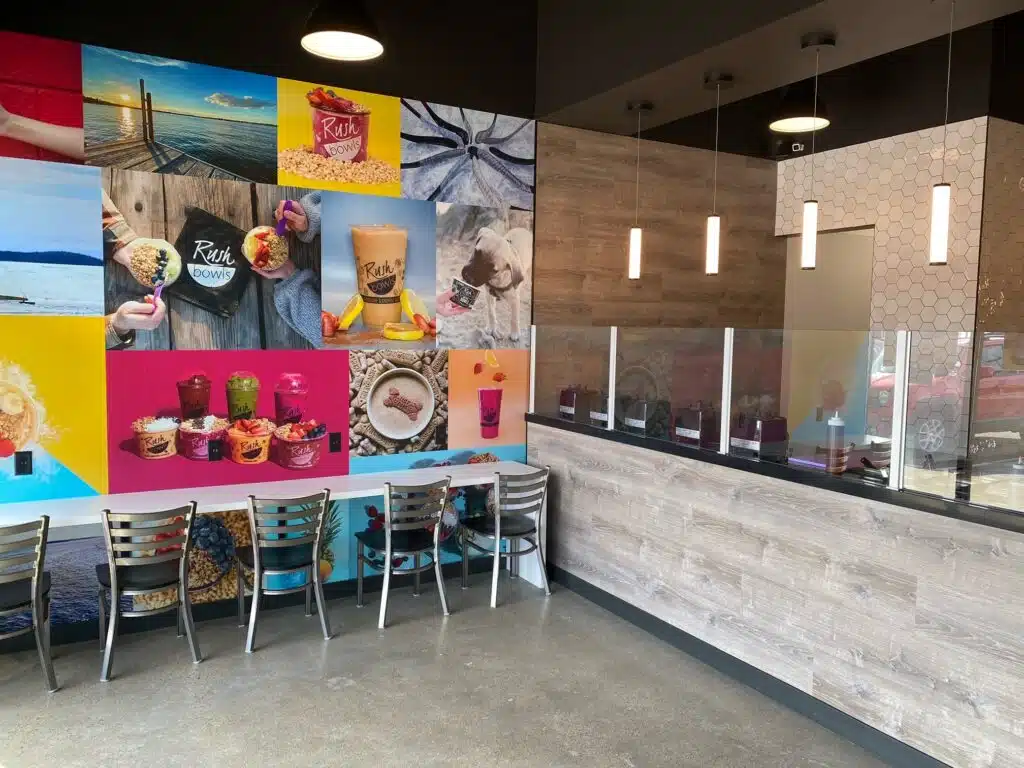
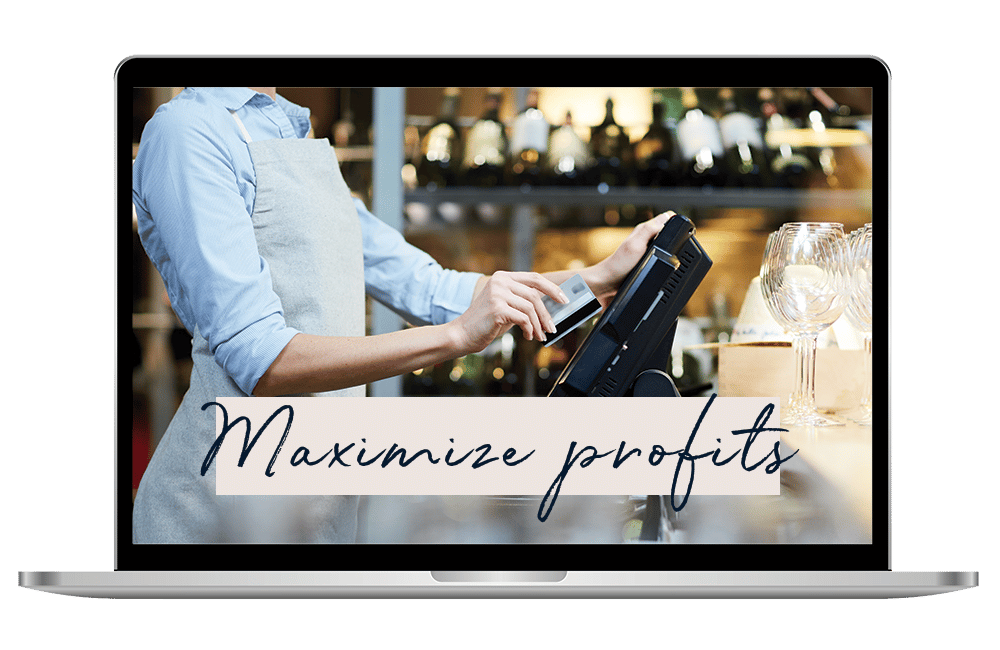
The three costly mistakes you could unknowingly be making?
Find out in this FREE guide and restaurant assessment specifically designed to reveal the unexpected hurdles standing between you and exponential business growth.
Thank You To Our Sponsors

The Employee Retention Tax Credit We will help you determine your eligibility for 2020 & 2021 - Get Started
Did You Know That 7 out of 10 Adults Dine Out To Celebrate Birthdays?
You Can Easily Capture This Lucrative Business!
Want to become a podcast sponsor?
Please get in touch with Roger at roger@restaurantrockstars.com
